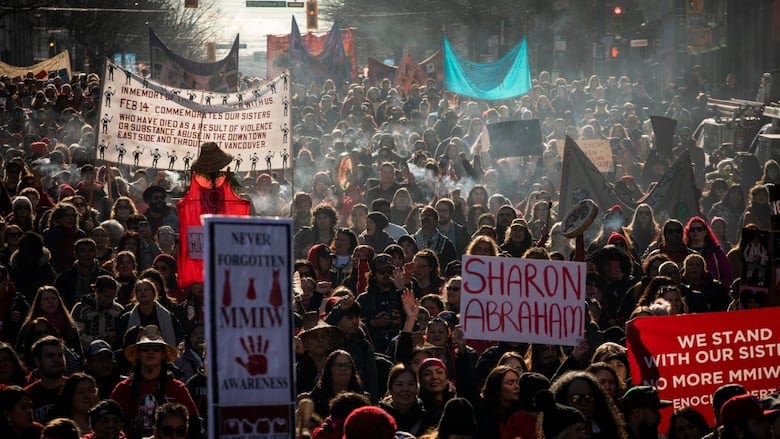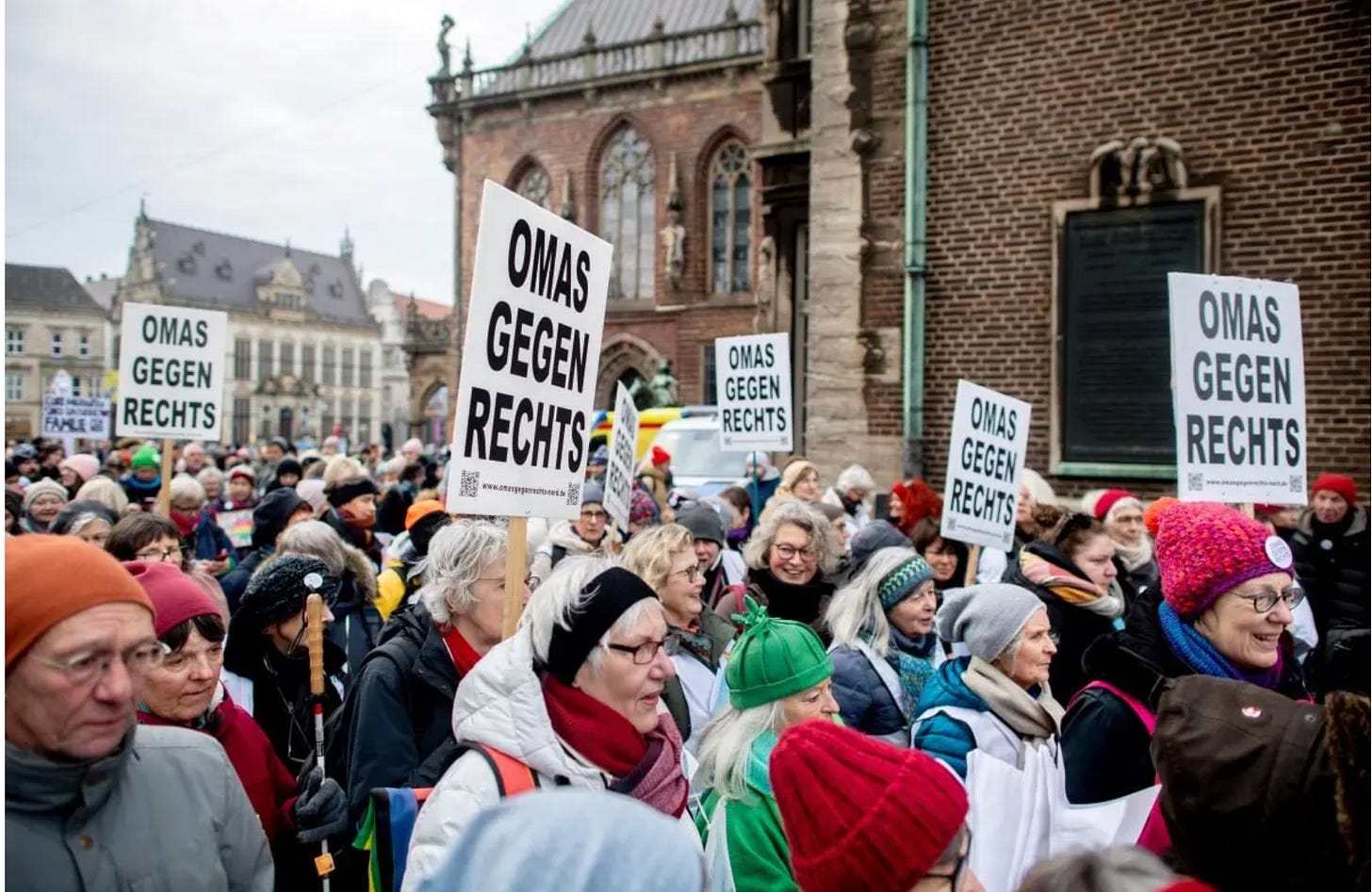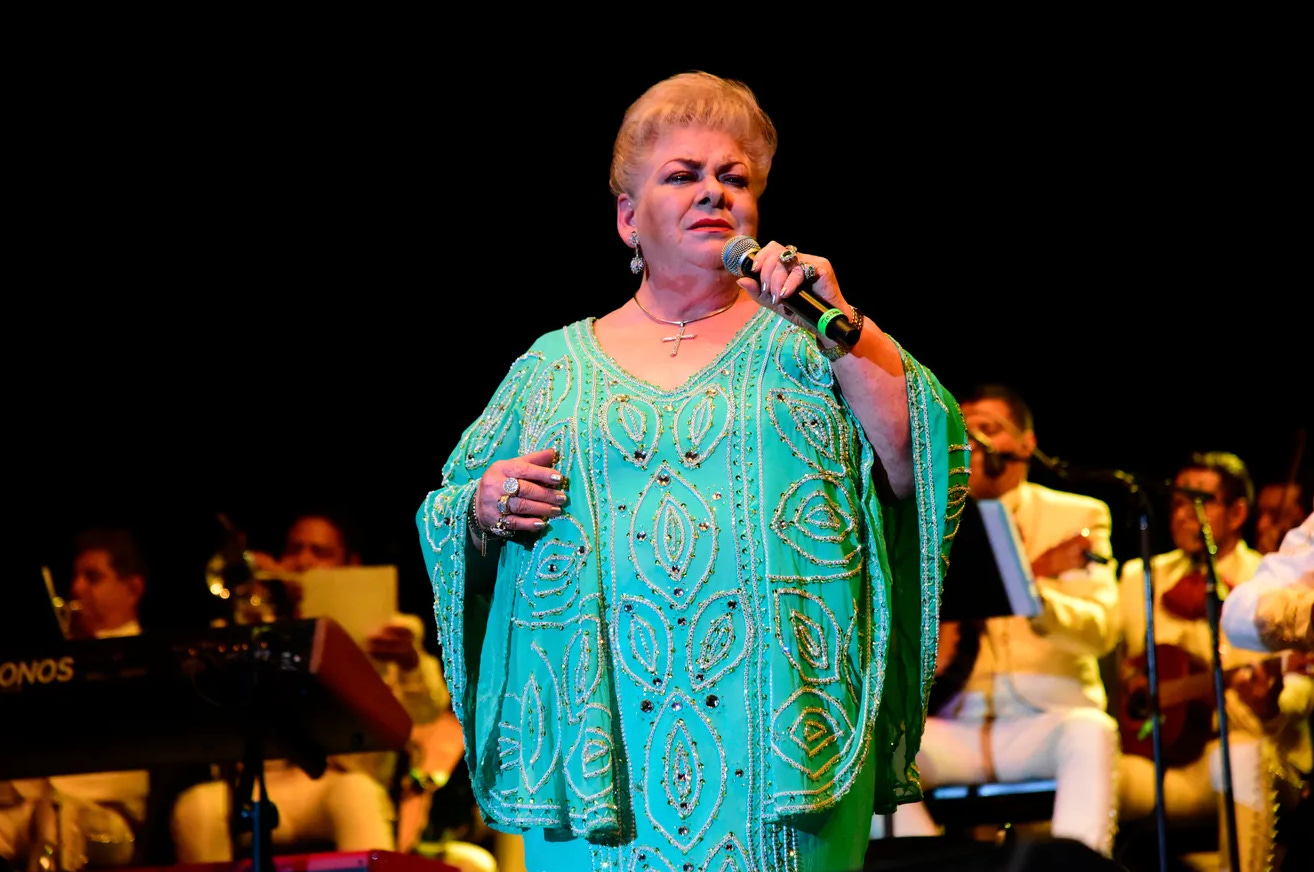Global Roundup: March for Indigenous Women & Girls, Protest vs Removal of T from LGBTQ at Stonewall, "Grannies Against The Right" in Germany, Black Power Salute vs Racism, Paquita la del Barrio Legacy
Hundreds of people turned out for the Women's Memorial March in Vancouver on Friday, Feb. 14, 2025. (Ben Nelms/CBC)
The march was first held in 1992 after an Indigenous woman, Cheryl Ann Joe, was found murdered on Powell Street at the age of 26.
Since then, thousands of people have taken to the streets in memory of Indigenous women and girls who have suffered similar fates or have gone missing, as well as to show support for their families.
Carol Martin, who is on the memorial march committee, was at the meeting where the idea to create a memorial march was pitched. Thirty-four years later, she is still marching and spreading awareness.
Martin says that the march was chosen to be on Valentine's Day because it is a worldwide day of love.
The march is to honour and commemorate the lives of women and all who identify as women . . . we are not about division here. -Carol Martin
The yellow and lilac pin on the march poster and physical pins that are given to participants at the march represent hope and healing, said Martin.
Participants stop during the march to place traditional medicines, such as tobacco and cedar, down onto the places where women were found to honour their memory and to bless the places where they were found.
Some of those in the procession have travelled from as far as Saskatchewan to participate.
Chief Lee-Anne Kehler from Kawacatoose First Nation in Saskatchewan attended the march with Diamond Poorman, Chelsea Poorman's sister.
Chelsea Poorman went missing one month after moving to Vancouver in 2020. Her remains were found in 2022 outside a vacant mansion in the Shaughnessy neighbourhood, a year and a half after she was reported missing.
We love our people. We love our family members. Everybody no matter what walk of life they come from, they're loved by somebody. I think that's important to emphasize on Valentine's Day. -Chief Lee-Anne Kehler
Jay Walker, center, an organizer of a protest at the Stonewall National Monument site. Credit...Brittainy Newman for The New York Times
The NPS did this to comply with President Donald Trump’s executive order prohibiting any official recognition of transgender people within U.S. departments, agencies and workforces.
Chloe Elentári, a transgender woman who lives in Manhattan’s East Village, was among the protesters at the Stonewall site. She said the move was a reminder that the city might be less of a haven than some residents think.
People say that you know you’re in a safe state, you’re in a blue state, but we’re not…We can’t live under the illusion of thinking that we’re safe just because we’re in New York. -Chloe Elentári
The Stonewall Inn, a bar on Christopher Street, has been seen as a cradle of the L.G.B.T.Q. rights movement since a police raid in June 1969 set off three days of protests and riots on the surrounding Greenwich Village streets.
Today, the riots are commemorated with Pride marches in New York City and around the world, and many gay rights organizations and venues in other countries use “Stonewall” in their names.
In recent weeks, transgender New Yorkers and health care professionals in the city have faced executive orders that seek to bar hospitals from providing certain kinds of care for transgender youth. The orders have caused fear among transgender people and their families, at least one lawsuit and protests outside hospitals.
Erik Bottcher, the City Council member who represents the neighborhood that includes the monument, said the removal of some words and letters but not others was an attempt to divide and weaken the community.
We are here to send a message to Donald Trump…We will not let you erase the existence of our trans siblings. -Erik Bottcher
Many social media commenters were baffled when the NPS Service removed all mention of the initialism LGBTQ+ and replaced it with LGB, and removed all references to the transgender figures like Zazu Nova who is now being described on the website simply as a “black woman” instead of her previous designation as a “black transgender woman.”
The Stonewall Inn and The Stonewall Inn Gives Back Initiative are outraged and appalled by the recent removal of the word ‘transgender’ from the Stonewall National Monument page on the National Park Service website. This blatant act of erasure not only distorts the truth of our history, but it also dishonors the immense contributions of transgender individuals — especially transgender women of color — who were at the forefront of the Stonewall Riots and the broader fight for LGBTQ+ rights. -The Stonewall Inn
The Stonewall Riots were a series of protests in New York City from June 28 to July 3, 1969. At the time, homosexuality and gender nonconformity was illegal throughout the nation, and locations where LGBTQ+ people congregated were subjected to police raids.
One such meeting place was the Stonewall Inn, a gay tavern in Greenwich Village. During one of these raids, patrons decided they had enough of being harassed and criminalized by law enforcement and began to fight back sparking a six-day riot that became a turning point for LGBTQ+ rights and marked the start of the modern LGBTQ+ civil rights movement.
It is widely believed that the two main participants of these riots were Marsha P. Johnson and Silvia Rivera, along with Zazu Nova who is believed by many to have thrown the legendary “first brick” — all three individuals are transgender women.
The first people that threw the brick at Stonewall, that led the charge at Stonewall, were women of color, trans women of color. Are we seriously trying to erase, like, entire history? -Eli Shirk, a 19-year-old transgender student at Pace University
Numerous people, including participants of the organization "Omas gegen Rechts", demonstrate against right-wing extremism at the Domshof in Bremen. Photo: picture alliance/dpa | Hauke-Christian Dittrich
Tens of thousands of people joined a demonstration against cooperation with the far right in Berlin on Sunday, after US Vice-President JD Vance called for Germany to drop the longstanding taboo. Among the protesters are senior women holding slogans reading "Omas gegen Rechts" or "Grannies against far right". For these women, who grew up in post-war Germany, the prospect of the far right returning to power is inconceivable.
Ahead of Germany's February 23 election, the "Omas Gegen Rechts" have amped up their campaign against the far-right Alternative for Germany (AfD), which is polling at a record 20 percent or higher.
Most of the group's members either have early-childhood memories of Nazi Germany or grew up amid the rubble of the devastated and shamed country, now determined to warn younger generations of the dangers of political extremism.
"Whenever there's anti-democratic behaviour, we can't stay quiet," said Uta Saenger, one of the organisers of a nationwide day of action earlier this month that drew 24,000 people in the northern city of Hannover alone.
"In the past year we have held or participated in over 80 protests," Maja, a 72-year-old member in Berlin, told AFP, saying many rallies were shows of solidarity at synagogues against antisemitism.
She said her Jewish background made the issue deeply personal, as "my grandmother had to leave Germany with my father".
At another recent rally, held in the city of Nuremberg, the Omas were out in force again, some of them holding up a knitted banner in the form of a "firewall".
That is a reference to the long-established agreement between Germany's mainstream parties not to cooperate with extremists in any form.
Many accuse the conservative CDU, which is leading the polls at around 30 percent, of blowing a hole in the firewall last month by teaming up with the AfD to push a motion curbing immigration through parliament.
CDU leader Friedrich Merz has insisted he is not seeking any further cooperation with the far-right and argues that action is needed after a spate of deadly attacks blamed on migrants and asylum seekers.
Gabi Heller, 58 and one of the founders of the Nuremberg chapter of the Omas, told AFP that "it's an easy solution to blame migration for everything, but this is just total nonsense".
Speaking during a demonstration held on the 80th anniversary of the liberation of the Auschwitz concentration camp by the Red Army, she said she wanted to "preserve democracy" for her three grandchildren.
The Omas movement started in 2017 in Austria, where the far-right Freedom Party (FPOe) has long been a more established part of the political scene than Germany's AfD.
In Austria, too, the Omas have been regulars at demonstrations against the FPOe, sometimes even regaling the crowds with a song or two.
But despite their efforts, the FPOe came first in a general election for the first time last year.
Eva-Maria Singer, 73, who has been a member of the Omas in Nuremberg for three years, said her generation who came of age in the protests of the 1960s were "too naive".
On the far right, she said "we thought we had eradicated it, but that's not true, now it's growing again".
Nevertheless, Singer stressed that "we are fighting against it and we believe we can win".
Manchester City’s Khadija Shaw gestures as she celebrates scoring their side’s second goal during the English women’s Super League match between Manchester City and Liverpool, at the Manchester City Joie Stadium, Manchester, England, Sunday, Feb. 16, 2025. (Martin Rickett/PA via AP)
The Jamaica international, one of the world’s best strikers, performed the Black Power salute during City’s 4-0 win over Liverpool in the Women’s Super League on Sunday, when she scored two goals.
It’s powerful, obviously…Bunny’s a proud Black woman and where she’s come from means a lot to her. -City manager Gareth Taylor
Shaw was targeted by online abuse after a league game against Arsenal on Feb. 2. She withdrew from the League Cup semifinal match against the same opponent four days later, before returning — as a substitute — for an FA Cup match on Feb. 9.
Sunday’s match against Liverpool marked Shaw’s return to the starting lineup and she said it was “definitely good to get back on the scoresheet after a difficult couple of days.”
Taylor said Shaw’s teammates “were there for her” during the game.
It’s nice for her to be able to feel the love from the supporters and the club. -Gareth Taylor
The Black Power salute was a gesture famously performed by 200-meter U.S. medalists John Carlos and Tommie Smith on the victory stand at the Olympic Games in Mexico City in 1968 to protest racial injustice.
Photo via El Paso Times
[She] left an indelible mark with her unmistakable voice and unique style, [her music] transcended generations and became anthems of female empowerment and social criticism. -Mexico City's Department of Culture
In the 1980s, Paquita la del Barrio — which translates informally to Paquita from the block — became a household name in Mexico, where she was embraced for the disdain with which she wrote and sang about the men who broke her heart. In one of her biggest hits, "Rata de dos patas," she famously compared an ex-lover to a two-legged rat, a cursed leech and a poisonous snake.
Paquita's biting — sometimes bitter — lyricism grew out of what she described as personal experience. Born Francisca Viveros Barradas in 1947, she was still a teenager when she eloped with a man more than 20 years her senior. After giving birth to two of his sons, Barradas said she learned her husband had been hiding a second wife and family.
I've suffered a lot. It's difficult because the heart goes where it wants…Those feelings are what guide people to my music. -Paquita la del Barrio
She began performing in cantinas around Mexico City in the 1970s. Initially, she sang with her sister in the duo Las Golondrinas, and later debuted as a solo artist under a new artistic name: Paquita la del Barrio. She went on to record more than 30 albums and tour extensively across South America, Spain and the United States.
We Mexicans have this machismo situation. Women are always hurt by what men do to them. I don't sing what others sing. I sing the truth, even if the gentlemen don't like it.' -Paquita la del Barrio
During her career, Paquita la del Barrio received two Latin Grammy nominations, five entries on Billboard's Top Latin Albums chart and a Lifetime Achievement Award at the 2021 Billboard Latin Music Awards.
In feminist anthems like "Tres veces te engañé," Paquita powerfully transformed her pain into lyrics of full-bodied rage. Empowerment, too. In the chorus, she sang, "three times I cheated on you. The first time out of anger. The second time on a whim. The third time for my pleasure."
The unapologetic nature of her music and public image was cemented by another line from the same song, "Me estás oyendo, inútil?" It would become Paquita la del Barrio's catchphrase. In English, it means "Are you listening to me, you good-for-nothing?"
Mona Eltahawy is a feminist author, commentator and disruptor of patriarchy. She is editing an anthology on menopause called Bloody Hell!: Adventures in Menopause from Around the World. Her first book Headscarves and Hymens: Why the Middle East Needs a Sexual Revolution (2015) targeted patriarchy in the Middle East and North Africa and her second The Seven Necessary Sins For Women and Girls (2019) took her disruption worldwide. It is now available in Ireland and the UK. Her commentary has appeared in media around the world and she makes video essays and writes a newsletter as FEMINIST GIANT.
I appreciate your support. If you like this piece and you want to further support my writing, you can like/comment below, forward this article to others, or send a gift subscription to someone else today.






